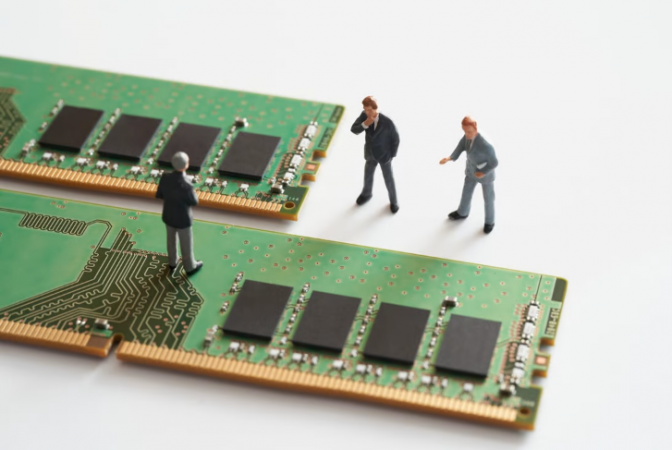
Beijing: Analysts claim that since Washington has broadened the scope of US tech export controls targeted at chip makers on the mainland, China's ambitious drive for semiconductor self-sufficiency is now facing greater challenges. On October 7, updates were implemented by the Bureau of Industry and Security (BIS), a division of the US Department of Commerce, that further limit China's access to supercomputers, advanced semiconductors, and advanced computing chips used in military applications, including the production of weapons of mass destruction.
Also Read: China now plays a new role in conflicts in Africa, no longer acting as a "passive observer"
According to the updates, products destined for Chinese chip foundries will now need new licences and be subject to a "presumption of denial." Comparatively, decisions regarding mainland chip fabrication facilities owned by multinationals will be made case-by-case.
The following thresholds are relevant: dynamic random access memory chips with an 18nm half-pitch or less; logic chips with a 16-nanometer or 14-nanometer or smaller; and NAND flash memory chips with 128 layers or more.
Arisa Liu, a senior semiconductor research fellow at the Taiwan Institute of Economic Research, declared that "a siege is forming." The increased US export controls on technology are intended to harm China's prowess in supercomputing, AI, and semiconductor production.
In addition, exporting equipment used to develop or produce semiconductor manufacturing equipment and associated items will now require a new licence from the US.
However, the tightened regulations create a Temporary General Licence. By allowing specific, restricted manufacturing activities related to goods intended for use outside of China, this would minimise the short-term impact on the semiconductor supply chain.
However, research fellow Liu predicts that China's semiconductor self-sufficiency will suffer as a result of the most recent US export restrictions on technology.
The effects of the most recent restrictions are likely to cause further shockwaves in China's semiconductor industry, posing a serious challenge to Beijing's leaders regarding how to maintain the nation's programme of high-tech self-sufficiency.
Also Read: Shaquille O’Neal talks about Jeff Bezos’s investing principle
The shares of China's top chip manufacturers fell on Monday. The largest semiconductor manufacturer in China, Semiconductor Manufacturing International Corp, fell 3.4% to HK$16.62 (US$2.12), while Hua Hong Semiconductor fell 9.6% to HK$16.34.
Shares of Naura Technology Group, the largest manufacturer of semiconductor equipment in China, decreased 10% on Monday to close at 250.56 yuan (US$35.02).
Gu Wenjun, chief analyst at research firm ICwise, wrote in a research note that the US sanctions have "filled the whole Chinese chip industry with a sense of chill" because Washington is using semiconductor technology as a tool to contain China's advancement.
There is no chance of reconciliation, Gu said. "China's semiconductor industry faces unprecedented challenges."
The US export blacklist, formally known as the Entity List, and the Unverified List policies were also updated by the BIS. If checks are requested but not completed due to host government inaction, the BIS will add parties to the Unverified List 60 days after the request.
Due to persistent host government unwillingness to assist the agency's review, a 60-day process is required to add Unverified List parties to the Entity List.
According to a recent note from integrated circuit research company TrendForce, Yangtze Memory Technologies Co (YMTC), for instance, is anticipated to find it more difficult to increase the number of non-Chinese customers for memory chips as a result of the most recent restrictions.
Among the 31 organisations recently added to Washington's Unverified List were YMTC, China's top NAND flash manufacturer, DK Laser, and Beijing Naura Magnetoelectric Technology Co.
The most recent restrictions added advanced computing and products like supercomputers to the list of items covered by the US Foreign Direct Product Rule.
Also Read: Why does the US forbid tomato exports from Xinjiang?
The 28 Chinese companies added to Washington's trade blacklist between 2015 and 2021 are anticipated to find it more difficult to acquire such foreign-produced goods that contain US-origin technologies as a result of this.
One of the 28 new entities on the Entity List were the manufacturers of graphics processing units, Changsha Jingjia Microelectronics Co.
Some analysts anticipate Beijing to pursue lobbying efforts in Washington, despite the fact that Mao Ning, a spokeswoman for the Chinese Foreign Ministry, described the most recent restrictions as a way for the US to "maintain technological hegemony."
After the midterm elections in the US this year and before the following US presidential elections in 2024, China is anticipated to "encourage US firms to lobby the administration," according to Woz Ahmed, managing director at consultancy Chilli Ventures.
Meanwhile, Ahmed claimed that China's deep-tech "Long March"—which alludes to the year-long struggle for survival for China's Communist forces beginning in October 1934—may have only recently begun.